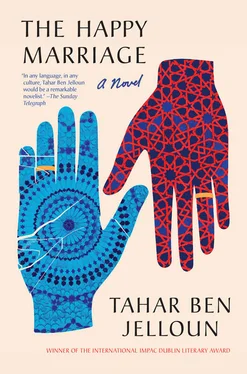The painter had looked at his wife while she performed good deeds and had been happy. The sky had been a spotless blue and the nights bitingly cold. She had snuggled against him to keep warm, but also because she’d felt her man belonged to her. She’d held him, pressing him against her with all her strength as if to tell him that she would be with him forever. For a moment, he wondered whether she’d brought him there so as to cast a spell on him. After all, didn’t she believe in sorcery just like all the other women in the village? He’d banished that unenlightened idea from his thoughts.
He would have liked to make love to her that evening in order to put a seal on their reunion, but they hadn’t been alone in the room. Children were sleeping next to them. She’d kissed him tenderly and whispered in his ear: “My man, you are my man …” then she’d stroked his chest for a long time.
They’d woken up early the next morning, and had a traditional breakfast. The coffee had been undrinkable, and the mixture of chickpeas grilled with some coffee beans had left an unusual taste in his mouth. He’d asked for tea, which had alas proved too sweet. Afterwards, they’d left the village to go for a walk on the road that led up the mountain. They’d held hands. She’d felt carefree, lighthearted. He’d told her that one day they would make a similar journey, to his native city of Fez. She’d told him she would like that, but on the condition that they didn’t go see his family, and especially his aunt, the memory of whom was quite traumatizing for her. He’d refrained from making any comments, fearing that the slightest slip would spoil that blessed moment that he’d wanted to draw out as much as he could. He hadn’t seen her so calm for months.
They’d walked for a long time and forgotten all about time. Having reached the top of the mountain, they’d come across a shepherd playing the flute. It had looked like something out of a picture book. They’d rested for a while next to him. After he’d left with his herd of goats, they’d found themselves alone once again. She’d kissed him tenderly on the lips. He’d wanted to have her at that exact moment, and had scanned the surroundings. Then she’d noticed a little cabin. They’d entered it, thrown themselves down on the hay, and undressed. They made love slowly. They had to come back there, he’d told himself, since his wife had been completely changed by the experience.
They had stayed in that cabin for a long time and had fallen asleep. As was the local tradition, the shepherd brought them fresh whey and some dates. It was their way of welcoming guests. The sun was setting. It was getting cold. The shepherd asked them a few questions about their life and told them that he’d never left the mountain, so was curious about what life was like in the city. Nevertheless, he had a little black-and-white television that was fueled by a gas cylinder. That window on the world pleased him a great deal. It allowed him to travel even to France, the country where his father and uncle worked.
They’d stood to leave, fearing the night would overtake them. The nights were long and dark in January. The shepherd had been pleased by their unexpected visit. To thank him, the painter had offered him his sunglasses as a present: “You need them more than I do! You’re always out in the sun, you must protect your eyes!” The thought of wearing fashionable sunglasses had seemed to make the shepherd mad with joy. He put them on immediately and said he could see the mountain and the valley in a different way, claiming that even his sheep had a different color to them. He’d laughed, all the while showering a thousand blessings upon them. The painter’s wife had slipped a hundred-dirham note in his pocket. Then the shepherd had kissed her hand, which had been embarrassing.
During their descent, their tiredness made itself felt, but it had been a good kind of tired, the kind that would lead them to their bed, where they would fall asleep immediately. They had been hungry and had dreamed of a piece of buttered bread, just like in Paris. But the lady with whom they’d been lodging had prepared couscous with seven vegetables for them. They’d stuffed themselves like foreign tourists. He’d had some difficulty stomaching rancid butter. Yet her eyes had ballooned and she’d told him: “It’s good, darling. It’s very good for your health, for your eyes, the memory, the imagination, and your creativity!” He hadn’t had the time to do any sketching, but everything had left a strong imprint on his memory. He would often think about the very specific color of the sky there; he’d asked himself how he would replicate its effect on the canvas later. The sky in the south had nothing in common with the one in Casablanca, which was whitish, and even less so with Paris’s, which was rather gray. There, in the deepest depths of Morocco, far away from all the pollution, the sky was a soft, subtle blue. Contrary to what one might expect, Delacroix had never painted anything while in Morocco. He’d merely taken some notes and drawn in his notebooks. It was only on his return to France that he’d found that country’s colors and figured out how to reproduce them in his paintings.
The following day, they had taken some pictures of the village. The children had rushed toward them to pose so they could be in the shot. The women had refused to let themselves be photographed. They said they were afraid the machine would capture their souls! One of them had even turned their back to them. She’d laughed and said: “I’m very attached to my soul!” She’d worn a flower-patterned robe. It looked like a scene out of one of the paintings of Jacques Majorelle, the painter of Marrakech.
It was finally time for them to leave. They had said goodbye to everyone, climbed inside their car, and taken the road to Agadir. They’d spent the night in a pretty hotel on the beach. The painter tried to picture the city as it had once looked. Before the earthquake of February 29, 1960. He had seen one of his primary school teachers cry when it happened. The teacher had lost his entire family.
Agadir had been entirely rebuilt since then. There were rows of hotels that stretched out into infinity. The city now devoted itself only to tourism. Its soul had been buried. In 1960, the painter had only been six years old, whereas his wife hadn’t even been born yet. He had kept a vivid memory of that distraught teacher alive in his mind. His father had been so dismayed that he’d even doubted the goodness of God. People had spread rumors that the earthquake had been a form of divine retribution. All of this had left a fuzzy impression in that six-year-old boy’s mind. But the memory of that catastrophe had accompanied him for the rest of his life.
They had walked around the city’s various markets. People in Agadir were very different to the Marrakechis. Their natural sense of dignity commanded respect. But would he have been able to live in a city that had been rebuilt as though it had undergone several rounds of plastic surgery? Nothing spoke to him there. He’d remarked to his wife that she looked sad. They went back on the road early the next morning, before her mood could grow somber again. She had taken over at the wheel and started driving very fast. He’d observed how adroitly she’d learned to handle that big car. It was as if the person next to him had transformed into a woman he didn’t know, a woman who was determined and fearless.
The police stopped her for speeding. The painter was almost relieved that she’d been pulled over. At first, his wife had tried to bribe them. Then one of the two policemen had given her a lecture. Then his wife had spoken to the policeman in Tamazight, and he’d replied in the same language. He gave her back her license and told her to drive carefully.
Читать дальше












